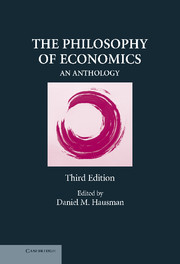Book contents
- Frontmatter
- Contents
- Introduction
- PART ONE CLASSIC DISCUSSIONS
- PART TWO POSITIVIST AND POPPERIAN VIEWS
- PART THREE IDEOLOGY AND NORMATIVE ECONOMICS
- PART FOUR BRANCHES AND SCHOOLS OF ECONOMICS AND THEIR METHODOLOGICAL PROBLEMS
- PART FIVE NEW DIRECTIONS IN ECONOMIC METHODOLOGY
- 22 The Rhetoric of This Economics
- 23 Realism
- 24 What Has Realism Got to Do with It?
- 25 Feminism and Economics
- 26 Credible Worlds: The Status of Theoretical Models in Economics
- Selected Bibliography of Books on Economic Methodology
- Index
- References
25 - Feminism and Economics
Published online by Cambridge University Press: 05 June 2012
- Frontmatter
- Contents
- Introduction
- PART ONE CLASSIC DISCUSSIONS
- PART TWO POSITIVIST AND POPPERIAN VIEWS
- PART THREE IDEOLOGY AND NORMATIVE ECONOMICS
- PART FOUR BRANCHES AND SCHOOLS OF ECONOMICS AND THEIR METHODOLOGICAL PROBLEMS
- PART FIVE NEW DIRECTIONS IN ECONOMIC METHODOLOGY
- 22 The Rhetoric of This Economics
- 23 Realism
- 24 What Has Realism Got to Do with It?
- 25 Feminism and Economics
- 26 Credible Worlds: The Status of Theoretical Models in Economics
- Selected Bibliography of Books on Economic Methodology
- Index
- References
Summary
Julie A. Nelson (1956–) is currently a Senior Research Associate with the Global Development and Environment Institute at Tufts University. She received her Ph. D. in Economics from the University of Wisconsin–Madison. Her work has included methodological reflections on feminist economics and empirical research concerning families and household consumption. Nelson is currently an Associate Editor of Feminist Economics. Her most recent book is Economics for Humans.
An article in The Chronicle of Higher Education of June 30, 1993, reported, “Two decades after it began redefining debates” in many other disciplines, “feminist thinking seems suddenly to have arrived in economics.” Many economists, of course, did not happen to be in the station when this train arrived, belated as it might be. Many who might have heard rumor of its coming have not yet learned just what arguments are involved or what it promises for the refinement of the profession. The purpose of this essay is to provide a low-cost way of gaining some familiarity.
Most people associate feminism with a political program, which of course it includes. While there are now many varieties of feminism, they all share a concern with remedying the disadvantages historically born by women. Such a concern has been manifested within the discipline of economics in the form of efforts to encourage the advancement of women within the profession (for example, by the Committee on the Status of Women in the Economic Profession) and sometimes by the application of economic analysis for feminist ends.
- Type
- Chapter
- Information
- The Philosophy of EconomicsAn Anthology, pp. 454 - 475Publisher: Cambridge University PressPrint publication year: 2007



